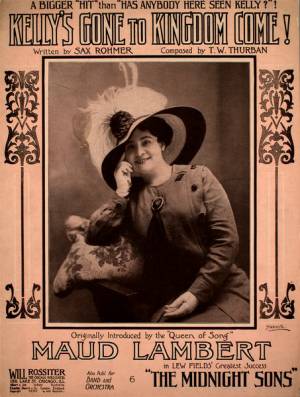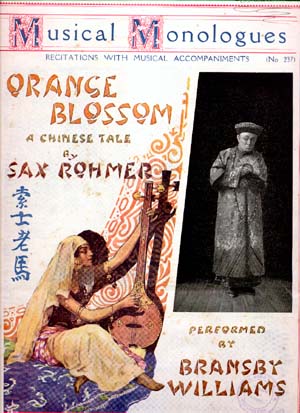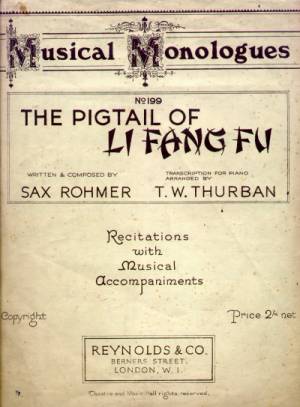"Aboo Tabah. A Turkish Episode. The Whistling Sergeant of the Pasha's Guard." By Sax Rohmer & T. W. Thurban. London: Charles Sheard & Co., Anglo-American Music Publishers, 1909 (sheet music).
"Any Other Day Will Do." By Sax Rohmer and Rosie Noel. The Weekly Dispatch, 12 June 1909. Sung by Marie Lorenzi.
"Bang Went the Chance of a Lifetime." News of the World, 27 September 1908 (lyrics); London: Francis, Day & Hunter, 1908 (sheet music). Sung by George Robey.
This song sung by Larry Barnes is included on the LP "EAMONN JONES PRESENTS AN EVENING WITH THE BEE & BUSTLE MUSIC HALL."
"The Camels' Parade. A Desert Arabesque." By Sax Rohmer & T. W. Thurban. London: Ascherberg, Hopwood & Crew, Ltd., 1910. Partial reprint in The "Strand" Musical Portfolio of Copyright Songs & Music, No. 8. Geo. Newnes Ltd., 1910(?).
"Charles II." Several lines quoted by Rohmer in an interview, "The Doctor's Blade," in the Talk of the Town column, The New Yorker, 29 November 1947. Comic song written for George Robey.
"Cold As Snow." Written for the BBC radio adaptation of White Velvet, 29 April - 1 July, 1940.
"The Fenman" (A Ballad of the Lowlands). Perhaps written as a song lyric.
"Ferdinand of Finchley." London: Francis, Day & Hunter, 19??. (sheet music).
"It's a Lie." News of the World, 28 March 1909 (lyrics); Francis, Day & Hunter, 19??. (sheet music). Sung by George Robey.

"Kelly's Gone to Kingdom Come." Charles Sheard & Co, 1910. Music by T. W.Thurban. Written for Lew Fields' stage review, "The Midnight Sons," in which it was sung by Maud Lambert.
The song was a response to an earlier (and still popular) song about a missing soldier, "Has Anybody Here Seen Kelly?" by C.W. Murphy, Will Letters, and William J. McKenna.
The song is mentioned by James Joyce in Ulysses: "Yes, by Jove, Mr Dedalus said. That will be worth seeing, faith. As they turned into Berkeley street a streetorgan near the Basin sent over and after them a rollicking rattling song of the halls. Has anybody here seen Kelly? Kay ee double ell wy."
The song is also mentioned in Peter S. Beagle's The Last Unicorn: "'They ride that horse you call the Macedonai,' he intoned absent-mindedly; and then, very clearly, 'Unicorn. Old French, unicorne. Latin, unicornis. Literally, one-horned: unus, one and cornu, a horn. A fabulous animal resembling a horse with one horn. Oh, I am a cook and a captain bold and the mate of the Nancy brig. Has anybody here seen Kelly?' He strutted joyously in the air, and the first fireflies blinked around him in wonder and grave doubt...."
"Mignon" (The Lady's-Maid). Words by Sax Rohmer, music by Alfred Glover. London: Price & Reynolds, 1911. (sheet music).
Included in Jokes, Jibes and Jingles by George Robey. London: Paxton, 1911. Sung by George Robey.

"Orange Blossom: A Chinese Tale." Musical Monologues: Recitations With Musical Accompaniments, No. 237. Reynolds & Co., 62a, Berners Street, London, W.1. Price 2s, nett. Performed by Bransby Williams.

"The Pigtail of Li Fang Fu." Musical Monologues, No. 199. London: Reynolds & Co., 1919. Transcription for piano arranged by T. W. Thurban. Written for and performed by Bransby Williams.
"Quare tristis es, anima mea?" Published anonymously. Journal of the Great War (edited by T. P. O'Connor), 1914. Reprinted in many provincial and colonial newspapers.
"In 1942 Rohmer re-titled this poem 'From the Dead to the Living' and added an Author's Note. This version failed to sell and remains unpublished." (R. E. Briney, e-mail, April 16, 1998)
"Shakespeare." News of the World, June 1909. Francis, Day & Hunter, 1909. (sheet music).
The News of the World Song Book, vol. 2, 1910.
The Rohmer Review #8, March 1972.
"Somebody's Got to Go Through It!" Words by Sax Rohmer; music by Alfred Glover. London: Price & Reynolds, 1911. (sheet music).
Included in Jokes, Jibes and Jingles by George Robey. London: Paxton, 1911. Sung by George Robey.
"There's Always Time to Say 'How Do'." By Sax Rohmer and Rosie Noel. The Weekly Dispatch, 6 March 1910. Sung by Charles Woodward.
"There is a Song My Heart will Always Sing" from the musical play "The nightingale, "lyrics by Michael Martin-Harvey & Sax Rohmer ; music by Kennedy Russell. London : Asherberg, Hopwood & Crew, c1947. 1 score ([5] p.) ; 28 cm. For voice and piano. Caption title. Pl. no. : A.H.& C. Ltd. 11942-3. "Lee Ephraim presents 'The nightingale'"--Cover.
"Twilight in Farmer Giles's Orchard." Date unknown. Written for Milly Lindon.
"Vain Regrets." Words by Sax Rohmer; music by H. E. Pether. London: Francis, Day & Hunter, 19??. (sheet music). Sung by Will Bentley.
"Well! What About It?" Written & composed by Sax Rohmer. Arranged for piano by Percy Ashdown. The Weekly Dispatch, 8 January 1911. Sung by George Robey.
